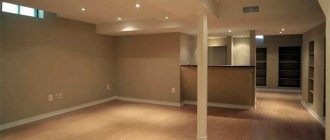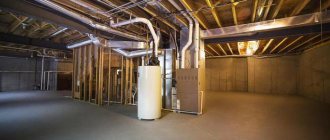The legislation of the housing and communal services sector clearly states who owns the basement in an apartment building: the owners of the apartments must dispose of no one’s footage. But, as you know, Russian laws are imperfect, and therefore the issue of dividing up a basement or attic often becomes the object of a dispute between residents, entrepreneurs and local authorities. For the right to use additional square meters, potential owners are ready to fight to the last, and some are so confident that they are right that they reach the highest levels of justice. In judicial practice one can find enough precedents on this issue. Let's try to find out whose basement is in an apartment building and who can use the underground space at their discretion.
What is the basement for?
Contradictions in existing and no longer legally binding regulations often lead to the ground floors of a building becoming ownerless and abandoned. The parties cannot agree who owns the basements in apartment buildings. Residents of high-rise buildings themselves do not in all cases have the right to equip the underground in their own interests.
The thing is that the main purpose of the underground floors is to accommodate communications, equipment and technical devices for year-round maintenance of the building. Here, in the underground room, there is usually a heating main and central nodes of electrical networks, water supply, heating, ventilation and other engineering systems. This part of the underground zone should be operated only for technical purposes by specialized services for the placement, modernization and repair of equipment that supplies electricity, heat, hot water, etc. to apartments.
On the other hand, the basement in an apartment building usually includes areas for non-technical purposes, which allows the territory to be used for organizing shops, warehouses, offices and other purposes.
Spontaneous seizure
When considering such cases in practice, there are often cases of spontaneous seizure of the basements of an apartment building, when the false owners assure everyone that they are the rightful owners, since they carried out the reconstruction at their own expense.
This development is a spontaneous seizure and is considered illegal. To eliminate the problem, you must go to court and file an appropriate claim. The dynamics of violations are often found in Soviet-era buildings.
In this case, drawing up a claim requires a general meeting, since only a group of homeowners can vote for the appropriate decision and appoint a proxy who will subsequently deal with the resolution of this issue.
What the law says
If you look at Article 36 of the Housing Code of the Russian Federation, it becomes extremely clear whose property it is. The basements of apartment buildings are common premises, to which each resident has rights. Apartment owners can decide for themselves how and for what purposes to use the underground space, since they are its full owners.
At the same time, the Supreme Arbitration Court of the Russian Federation established special regulations for the ownership and operation of basement floors. It was decided that the basement, which was not previously classified as common property and intended for individual use, becomes property simultaneously with the receipt of the right to own the apartment. It follows from this that the right to choose a basement is automatically given to the person who first purchased housing in a high-rise building. Accordingly, this owner receives an advantage due to earlier acquisition. The remaining residents who moved in later can claim the remaining free areas of underground space.
Article 290 of the Civil Code of the Russian Federation is devoted to the issue of use and ownership of a basement in an apartment building. Based on its content, it follows that the owners of apartments in a high-rise building, on the right of common shared ownership, are the owners of all non-residential premises, load-bearing structures, as well as equipment serving more than one apartment. Owners cannot alienate their share of the common property. It is also impossible to transfer the ownership of this share separately from the ownership of the residential premises.
Article 235 of the same Code provides a list of premises and territories that apartment owners have the right to legally use. These include:
- basements and other utility rooms for placing special equipment, including the attic, outbuildings, etc.;
- interfloor landings, stairs;
- elevators and corridors.
The main condition is that the space is not intended for special technical purposes.
Room for technical needs
It is possible to legally determine a place in the basement for each tenant. Since this part of the building is common property, apartment owners are interested in using it mainly for storing personal belongings and supplies. For many people, having a basement is an opportunity to stock up on bags of potatoes, preserves and jam for the winter. On the ground floor it is convenient to store car tires, skis, sleds, bicycles, strollers, rubber boats and many other things that have no place in the apartment and would not be desirable to clutter up the balcony.
Basement owners
Square meters of the lower floor of a building may belong to the owners of residential premises in a high-rise building if the following conditions are met:
- at the time of transfer (sale) of state or municipal property into private hands, the underground floor was not the property of third parties;
- the basement of an apartment building is actually separated from the housing and has no special purpose;
- on the ground floor there is communal and technical equipment put into operation to serve more than one apartment.
If the basement of a high-rise building is the property of all residents, then without the consent of even one of them it is impossible to rent out the premises, sell, exchange or make any other transaction. It is also allowed for the territory of the lower floor to be privately owned if it is occupied by an individual due to the advantage of early acquisition and occupancy. If we are talking about municipal apartments, that is, residential premises that are the property of local governments, the basement belongs exclusively to the municipal fund. In this case, the space can be used exclusively for servicing utility networks.
Buying out the basement from the building's residents
Is it possible to buy out a basement if it belongs to the owners of an apartment building? Yes, it is possible, but it is a complicated procedure . Before purchasing a basement, a potential buyer needs to organize a general meeting of the residents of the house.
If the majority of residents agree to sell the premises (there must be at least 75% of the votes), then the transaction is concluded with the participation of the owner of the house (a specific person will act as a representative of all owners and act on their behalf by proxy).
But buying a basement in this situation is extremely difficult, because in most cases the owners want to use the basement for their own needs.
What is self-capture
It often happens that the premises on the ground floor, despite the implementation of the privatization procedure, are occupied by other persons, without the knowledge and permission of the owners. At the same time, the illegal owners of the basement confidently stand their ground, proving that this area is occupied by them on legitimate grounds. One of them is rebuilding and equipping the basement at personal expense.
By the way, this argument is not enough to secure for the illegal occupier the right of sole ownership of the underground premises. After all, the law determines who can use the basement in an apartment building. A situation such as unauthorized occupation of an underground floor is most often encountered in secondary residential buildings built during the Soviet period.
In order to establish justice and return square meters to the use of the rightful owners, it will be necessary to organize a meeting of residents, establish when the change of owners occurred, and redistribute the square footage of the underground floor as expected. It is worth noting that in multi-storey residential buildings, decisions on the use of areas that are in shared ownership are made at housing meetings.
Carrying out redevelopment in the basement
The process of remodeling a basement helps to expand the living space, organize a place for entertainment and relaxation, and create a separate room for storing items that are rarely used in everyday life.
The following sequence of actions is used:
- preparation of plans;
- making a copy from the personal account;
- obtaining an extract from the house register, which reflects data on all persons registered in the house;
- certification of copies in a notary office;
- development of a redevelopment project.
You will need to contact the organization involved in creating projects. Often, utility services refuse to issue consent to redevelop a basement into a living space, since it does not meet sanitary requirements.
Important! It has been established that there must be at least 1 source of natural light in the room.
Who should be responsible for the condition of the basement?
In this context, the owners, that is, the residents of the apartment building, are also responsible. Consequently, the costs of maintaining the basement are divided equally among all shared owners. As for repairs and reconstruction, if work is necessary, all costs are borne by the management company with which the residents of the house have an agreement. Utility companies carry out their activities for a fee fixed in the agreement.
You can get the keys to the basement of an apartment building from the management company, which is responsible for maintaining the technical affairs and utilities of the apartment building. In buildings where the underground or ground floor belongs to residents on the basis of shared ownership, each resident can gain access if desired. It is important to understand that the management company does not have the authority to restrict the owners’ access to the basement and establish its own rules that were not agreed upon at the meeting of residents.
Getting permission
The territory of the ground floor is indeed considered the property of the residents of the apartment building. Who determines the rules for using the basement? It is not worth starting construction without coordinating further actions with the management company, since redevelopment of the underground compartment requires obtaining permission to carry out the corresponding redevelopment. To obtain official approval from the management company, you must submit an application signed by all initiators of organizing the storage facility. At the same time, each of the applicants must understand that all costs for construction work and further maintenance of the constructed utility block will fall entirely on their shoulders.
Is it possible to privatize the basement
If the underground floor is a common property, its sale, lease and other operations require the participation and consent of all owners. To privatize a plot of basement space, you will have to go through a long and complex procedure. However, you cannot deviate from the algorithm for carrying it out. Otherwise, the contract may be contested, and the transaction to transfer the basement into private ownership will be declared illegal.
The initiator of privatization must take care in advance of organizing a meeting of residents. Everyone who owns a basement in an apartment building, that is, all apartment owners, must be given an agenda that will indicate the main issues to be discussed, including the alienation of the underground territory of the building and changes in its boundaries. It is important to notify the owners and representatives of the management company no later than 10 days before the scheduled date of the meeting.
During the meetings, discussions and voting are held, the results of which will be recognized only if more than 50% of the total number of owners and members of the HOA are present. The decision to transfer ownership of the basement is made by a majority vote. Based on the results of the meeting, a resolution is drawn up - a document on the basis of which the further procedure for transferring the basement premises (its share) into private ownership will be carried out.
After receiving the minutes of the residents’ meeting, it is necessary to draw up a project for the redevelopment of the underground floor to be privatized. This paper must be agreed upon with several authorities, including sanitary and epidemiological services, fire inspection authorities and other regulatory structures. The prepared reconstruction project must be submitted to the BTI. If the project is approved at this level, work can begin to redevelop the basement.
The next stage is an examination of the technical condition of the premises, following which the owner will receive a conclusion. At the final stage of this procedure, submitting an application to the BTI again, but this time for re-registration of the registration certificate of an apartment building. Whose basement (underground area) must apply to Rosreestr with an application for the issuance of a certificate of registration of ownership. By the way, an individual does not have the right to privatize the entire square area under the building.
What documents are needed
In addition, a whole package of documents must be attached to the application. It must be collected and provided to the management company in order to obtain permission to develop and redevelop a non-residential basement. The list of required documents includes:
- Technical passport of the residential premises.
- Redevelopment project.
- Documents confirming ownership – title documents.
- Consent in writing to carry out redevelopment from other owners.
It should also be remembered that without proper registration of permitting documentation, redevelopment cannot be started. Today, for residents of apartment buildings, a fine of 2-2.5 thousand rubles has been established. for carrying out illegal reconstruction of non-residential premises.
Things are a little simpler with those houses where the basement is equipped for storage. In this case, it is important to enlist the support of the owners and allocate a personal share of the underground floor.
Rental
If the basement is common property, that is, it belongs to all owners of apartments in a residential building, then it can be rented out to trade and non-profit organizations only if a positive decision was made by a majority of votes at the general meeting.
However, owners have serious restrictions on their rights regarding the basement. The common property of an apartment building can actually be managed either by a management company or by a homeowners’ association. It is these management links that determine the intended purposes of the proceeds from the rental. For example, finances can be used for repairs, arrangement of a yard, construction of a playground, regular cleaning of the surrounding area, installation of CCTV cameras and other public needs.
Possible targeted spending of funds received from renting out the basement are discussed in advance when concluding an agreement between the management company and the apartment residents. Regardless of who the owner of the basement in an apartment building is, he always has the right to rent out his underground territory.
Is it legal to use private basements?
Today, basements are found in almost all houses built in Soviet times. Underground premises are designed specifically to ensure the vital functions of the entire structure. Heating risers, hot and cold water supply, gas pipelines and other mechanical, electrical, sanitary structures with shut-off valves are located in the basements of apartment buildings.
If at least one apartment in the house has become private, the basement can no longer be touched.
Disputes related to the ownership of basements and attics began to flare up everywhere from the moment the institution of residential private property appeared in our country. With the beginning of general privatization, the courts began to receive non-stop claims about the rights of homeowners, not for their residential footage, but for the square footage of attics, basements, elevators, landings and flights.
Whose property the basement of an apartment building belongs to is not of fundamental importance. It is important that the management company or HOA always have access to the basement floor. So, for example, in the event of an emergency, a separate entrance is cut off from the water supply, but if the employees of the utility company do not have access to risers with shut-off valves, they will have to turn off the water to the entire house.
Often the problem is aggravated by the fact that it is impossible to get to utility networks at night, as well as on weekends and holidays. If the owner of the basement (or part of it) is an entrepreneur, then organizations servicing the building are often faced with the inability to gain access to engineering equipment for the purpose of its scheduled inspection, repair or replacement of old communications in the allotted time. In the absence of a businessman or his representatives, utility workers are not able to get into the basement.
In addition, persons who have privatized underground premises often carry out its redevelopment without an approved project, permits and approvals from a number of authorities. Such reconstruction in most cases is illegal. In addition to everything, basement owners often decide to seize unowned square meters in order to increase the area of their site. Such uncoordinated actions lead to numerous violations, which result in damage to load-bearing walls and the appearance of cracks. All this eventually leads the house into disrepair.
No matter how strange it may sound, but, based on judicial practice, the claims of residents against “basement” entrepreneurs in most cases remain unsatisfied. Despite the obvious non-compliance with the requirements for the basements of apartment buildings, justice more often takes the side of businessmen, rather than actually refusing to recognize the ownership rights of residents to the utility rooms of the lower floor.
Arbitrage practice
Efforts by citizens to win ownership of basement premises in the courts are rarely crowned with success. In addition to the fierce defense of the private property of an entrepreneur, experienced lawyers are perplexed by the use of statutes of limitations by courts in cases of recovery of common shared property from illegal possession. The whole point is that claims for the return of shared property are negative, therefore, a priori, the claims of the applicants cannot have a statute of limitations. However, the courts, refusing to satisfy the claim, refer precisely to the passage of the statute of limitations. At the same time, the actual responsibility for maintaining the basement of an apartment building continues to fall on the shoulders of the residents.
An absurd understanding of legal norms not in favor of the legal owners is reflected in the resolution of property issues affecting other technical and utility premises. Most likely, when making a decision, judges do not take into account the specifics of these legal relations, and also do not always notice the pronounced nature of the violation of the rights of homeowners by businessmen who illegally become owners of common property.
Certain judicial precedents also raise questions, according to which only that part of the premises that was not used as an independent object in an apartment building is recognized as common property. Who owns the basement in this case?
For clarity and clarification, we will give an example. Let’s say that in the basement of a high-rise building in the late 80s of the last century, with the permission of the municipal authorities, a warehouse was opened, and in the early 90s, the first owner of a residential premises (apartment) appeared in the same building, who exercised his legal right to privatization. So, arbitration courts more often take the side of the warehouse owner and local authorities, guided by the fact that allegedly at the time of privatization of housing, the basement was operated as a separate and independent object, and therefore it is not possible to return it to common shared ownership.
The absurdity and absurdity of such a decision also lies in the fact that in connection with the transfer of ownership to commercial structures, no re-equipment of the underground floor, removal of utilities and equipment was carried out. The maintenance of the basements of an apartment building is still the responsibility of public utilities, which once again emphasizes their technical purpose. Thus, if the owner of a residential premises decides to store boxes with any goods, no one will have any doubt that his housing will still be considered a residential premises. To change the status of a residential property to non-residential, you will need to go through a long bureaucratic procedure.
The situation is similar with the basements of apartment buildings. A storage room or store located on an underground floor does not automatically change the status of the basement as a technical room. In fact, the underground space, owned by the owners on the basis of shared ownership, remains technical, and its commercial or other use cannot serve as a reason for depriving the homeowners of their ownership rights and using the premises for purposes that do not comply with the technical documentation.
Why do the courts take this position? It is likely that such decisions are dictated primarily by economic reasons. If the property is returned to the residents by taking it away from the purchaser, the latter will seek damages from the seller, that is, the municipality. And if we consider that there can be many such illegal transactions within one locality, the local budget can seriously suffer.
A striking precedent
Not long ago, the Supreme Court of the Russian Federation interpreted the decision and gave an explanation to local authorities after reviewing a case related to a basement in an apartment building. The influx of such claims has increased over the past few years, which makes each clarification of the RF Supreme Court especially interesting not only for the judiciary, but also for homeowners who are ready to defend their own rights.
The basement was owned and used by the residents from the moment the building was put into operation, but a few years later the municipality took away the technical space. In addition, part of the basement was rented out to a commercial enterprise. The situation may seem standard. But in this case, one of the apartment owners was not going to put up with the unfair state of affairs.
This story begins with an appeal to the court by a citizen who asked the district court to return the basement to the residents for legal use. The common property of the apartment building was in the illegal possession of the local administration. The building in which the citizen lives was put into operation in 1965. The underground floor houses engineering equipment that ensures the life of the five-story building. Residents began to privatize apartments in the 90s after the adoption of the relevant law giving such a right. The plaintiff-owner has no doubt that he and his neighbors have all the rights to own and use the technical premises intended to serve their apartments.
In 2009, the city administration became the owner of the basement in an apartment building. The plaintiff became aware of this after receiving a response to a request to the Unified State Register of Real Estate. Interestingly, the process of transition from private to city ownership took several years and was completed in 2007.
The basement of the apartment building, owned by the city, was divided into two sections. On the first floor there were engineering communications to ensure the normal functioning of the house (pipelines, taps, valves, dampers and other equipment). Their functioning was to be monitored by a management company, with which the residents, after the privatization of the apartments, entered into an agreement at one of the owners’ meetings. The second part of the basement was rented out to a commercial company.
The main claim that the resident of the house made in court was based on the lack of access to the basement of the apartment building. In his opinion, this threatens the health of citizens living in this building and the safety of their property. The reason is the inability to timely carry out repair work in the basement of an apartment building. In addition, we are talking here about an elementary violation of the legal rights of common shared property. The applicant asked the court to invalidate the registration of the basement in the Unified State Register as the property of the city administration and to impose a fine for failure to comply with the requirements for basements of apartment buildings.
The court of general jurisdiction did not satisfy the claim, justifying the refusal as an incorrectly chosen method of protecting the violated rights. The judge of the court of appeal also agreed with this argument, according to whom the basements cannot be a common household, because they supposedly have an independent purpose. Not intending to give up, the tenant reached the Judicial Collegium for Civil Cases of the Armed Forces of the Russian Federation, which rendered a verdict in his favor.
Nuances when determining owners
When considering the question of who owns the basement, it is necessary to take into account possible nuances when determining the owners:
- the owners of the basement are the residents who have registered shared ownership;
- property located in technical premises may be individual property and its maintenance is carried out at the expense of the owner;
- technical premises cannot be used for frequent needs, even if there is no appropriate equipment in the area;
- if the apartment building is not privatized, then its basements cannot be used for individual needs, as they belong to the local municipality.
Illegal seizure of a basement as a result of lack of familiarity with the legal provisions of the law implies the interested party going to court. Most often, if there is appropriate evidence, such claims are subject to satisfaction of the submitted claim.
What the Supreme Court of Russia ruled
The lower authorities made an incorrect decision. Guided by Article 290 of the Civil Code of the Russian Federation, which was noted earlier, owners of apartments in a high-rise building are the owners of common premises in the building, as well as co-owners of load-bearing structures, mechanical, electrical, plumbing and other equipment serving more than one apartment, regardless of location. The same is confirmed by Article 36 of the RF Housing Code cited by the Supreme Court. Legal norms include technical floors, attics, basements, inter-apartment landings, corridors, stairs, elevators, elevator shafts as objects of shared ownership. The Housing Code clearly states that owners of privatized apartments in state or municipal housing stock automatically become owners of common areas and utility equipment.
Delving into the above, it is worth noting that the Supreme Court implies the loss of the status of an object in municipal ownership from the moment citizens exercise their rights to privatization. Consequently, the owner of the basement in an apartment building becomes the full owner of at least one apartment or even a room. Legally, the regime of underground and other technical premises should be determined by the date of privatization of the first apartment of the entire building.
conclusions
Let's summarize. In order to make the right decision in such disputes, the court must first establish from what moment the first apartment in this building was privatized, whether engineering communications are located in the basement and whether it is intended to serve the entire house, and whether it was determined on the date of privatization for independent operation.
In the example considered, the court of general jurisdiction and the appeal were unable to correctly distribute the burden of proof, which led to a violation of legal norms. The plaintiff’s task is to find arguments and provide facts indicating that privatization was carried out during the period of maintenance of the basement of the entire house. The defendant will have to prove the opposite, that the basement is intended for independent use.





